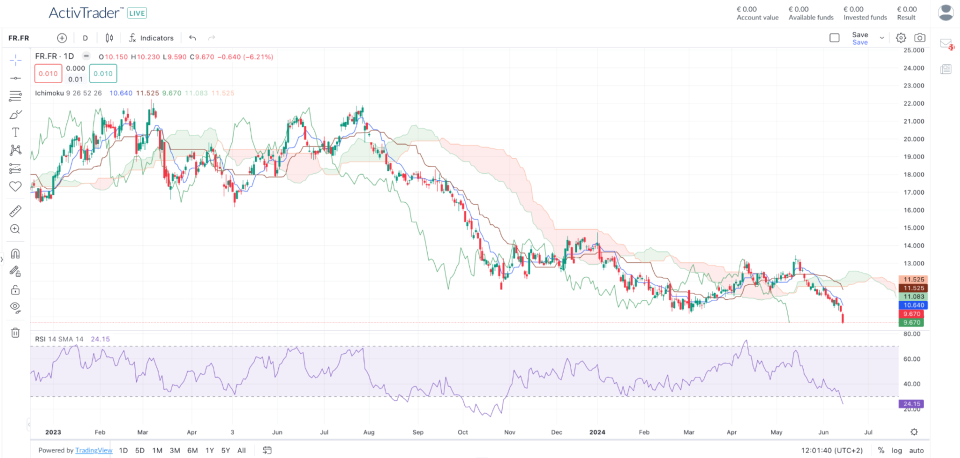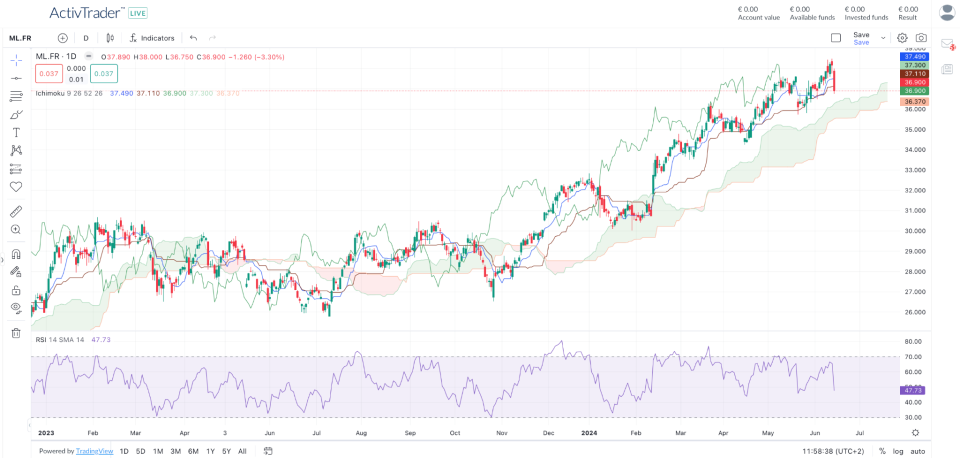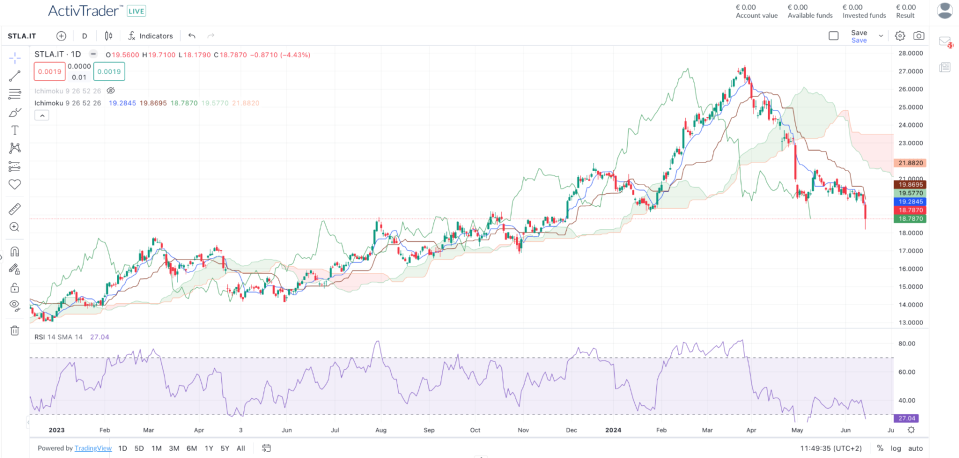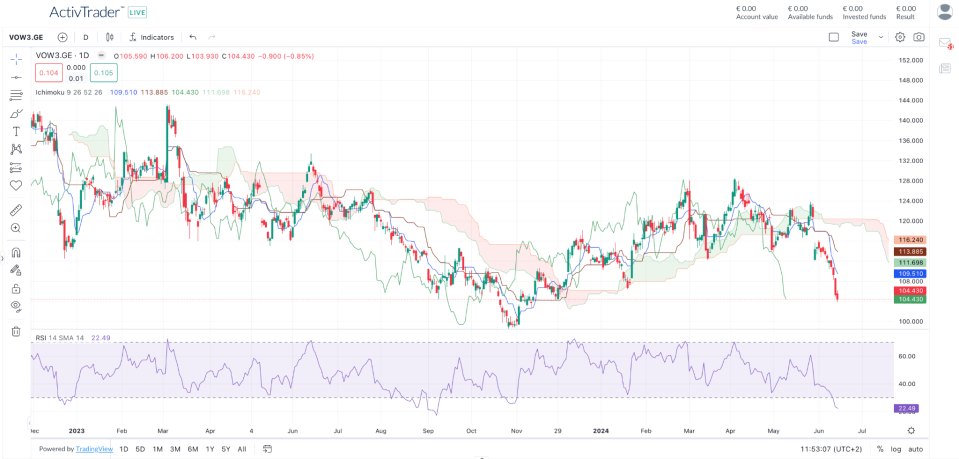French Auto Parts: Is the Glass Half Full or Half Empty for Valeo, Forvia, and Plastic Omnium?
Equipment manufacturers, the vital suppliers of components to carmakers, have been especially hard hit, with their share prices experiencing a dramatic plunge. This begs the question: is this a buying opportunity for these French stocks, or are there deeper issues at play? Let’s delve into the potential trends and risks shaping this sector.
Stocks of French Auto Parts: Valeo, Forvia, Plastic Omnium Dive, While Michelin Soars
Year-to-date (YTD), French stocks in the sector like Valeo (-30%), Forvia (-42%), and Plastic Omnium (-19%) have witnessed a substantial decline on the stock market. This trend becomes even more concerning when looking at the one-year performance, with these companies experiencing drops exceeding 53%, 48%, and 42% respectively.

Supports to monitor: €36.703 and €36.158
Resistances to monitor: €37.622 and €38.357
Michelin, however, stands out as a beacon of resilience in this storm. Its share price has defied the downward trend and outperformed, surging by more than 14% YTD and a remarkable 33% over the past year.

Supports to monitor: €36.703 and €36.158
Resistances to monitor: €37.622 and €38.357
French Auto Shock: Why Are These Stocks Sinking?
Car manufacturers, which are the main source of the demand for parts and components, have struggled due to lower profit margins and weaker sales, additionally they’re dealing with a number of major challenges around the world.
Stellantis, the world’s fourth-largest automaker formed by the 2021 merger of Fiat Chrysler Automobiles (FCA) and PSA Group, reported net revenues for the first quarter of 2024 down 12% compared to the same period in 2023. The company attributed the decline to a combination of factors, including lower sales (volume), a shift in the types of vehicles sold (mix), and unfavourable currency exchange rates (foreign exchange headwinds).

Supports to monitor: €8.928 and €8.160
Resistances to monitor: €9.67 and €10.22
What about the performance of our neighbours’ brands?
The German auto giant Volkswagen reported a 20% decline in first-quarter operating profit compared to the same period in 2023. The company attributed the drop to a 2% decrease in sales volume, higher fixed costs, and an unfavourable mix of countries, brands, and vehicle models sold.

Supports to monitor: €104.156 and €98.945
Resistances to monitor: €110.618 and €115.899
Let’s now take a closer look at potential challenges French auto part makers need to face to rebound.
Demand for new cars in France has taken a hit in 2024, with a noticeable decline in overall purchases and a more significant slowdown in electric vehicle (EV) sales. This trend is likely to continue, partly due to the recent reduction in the French government’s “ecological bonus” – a financial incentive for buyers of electric and plug-in hybrid vehicles.
Previously, the ecological bonus offered a significant price advantage for EVs, particularly for cost-conscious consumers. However, 2024 saw a reduction in the bonus for “more affluent households,” dropping from €5,000 to €4,000. While low-income households continue to benefit from a more substantial bonus of €7,000, the overall decrease in incentives has eroded some of the appeal of EVs for price-sensitive buyers. This could potentially discourage some from making the switch to electric mobility in the near term.
The automotive industry continues to grapple with a persistent global shortage of semiconductors, the tiny “brains” that drive modern vehicles, and other key components like certain metals and plastics, that started with Covid. This isn’t just a headache for carmakers; it’s a full-blown crisis for French auto parts suppliers who are caught in a vice.
The lack of readily available chips and other components has thrown a wrench into the well-oiled machinery of automotive supply chains. Parts manufacturers are unable to produce components at the expected pace, leading to delays and bottlenecks throughout the entire system.
Car manufacturers, unable to secure the essential chips needed for vehicle assembly, could be forced to halt or significantly slow down production lines, which directly impacts French suppliers who see their orders for components put on hold or drastically reduced.
The domino effect of production delays extends to profitability. Carmakers facing production shortfalls see their margins shrink. This pressure often translates down the supply chain, forcing French parts suppliers to potentially accept lower prices or tighter payment terms to maintain business with carmakers.
Inflation isn’t just a consumer concern, it’s a major challenge for French automotive suppliers. The prices of key commodities like steel, copper, and aluminium have been rising recently and are still quite volatile, putting a significant squeeze on profit margins for parts manufacturers.
The European Union’s ban on new combustion engine car sales by 2035 casts a long shadow over the French automotive sector, particularly for suppliers heavily reliant on traditional engine components. This transition to electric vehicles (EVs) presents a significant challenge on two fronts: stranded assets and declining demand and hurdles in the electrification race.
Companies specialising in combustion engine parts face the risk of their current knowledge and production capabilities becoming obsolete. Stockpiles of parts for gasoline and diesel engines could become stranded assets with declining demand.
As carmakers prioritise EV production, they may source components from different suppliers with expertise in EV technologies. This could lead to a decline in demand for traditional engine parts, potentially forcing French suppliers to downsize or exit the market entirely.
The shift to EVs necessitates significant investments in research and development (R&D) for new technologies like electric motors, battery management systems, and power electronics. French suppliers accustomed to traditional engine parts might lack the resources or expertise to compete in this new technological landscape.
The EV market is already attracting established players from the tech and battery sectors, along with new entrants. This intensifies competition for French suppliers who may struggle to keep pace with the rapid technological advancements needed for EVs.
The French automotive equipment sector is also facing a new and aggressive competitor on all fronts: China. Chinese auto parts manufacturers are rapidly emerging as major players in the global market, and their competitive edge poses a significant threat to French companies.
Chinese manufacturers often benefit from lower production costs due to factors like economies of scale and potentially lower labour costs. This allows them to offer competitive pricing, making it harder for French companies to compete on price alone.
Additionally, the perception of Chinese auto parts as simply “cheap alternatives” is fading. Chinese companies are increasingly investing in research and development, producing innovative and technologically advanced components. This puts them in direct competition with French manufacturers, who may need to accelerate their own innovation efforts.
The Chinese government has prioritised the development of its domestic auto industry, including parts manufacturers.This can translate to financial subsidies and other forms of state support, giving Chinese companies an additional edge in the global market.
What Should French Automotive Suppliers Do To Rebound?
The French automotive supplier sector finds itself at a crossroads. While major challenges loom, promising opportunities also beckon. To thrive in this complex environment, French suppliers must adapt quickly and embrace strategic themes.
The shift towards EVs is an undeniable force. French suppliers must invest in R&D to develop expertise in EV technologies like electric motors, battery management systems, and power electronics. This will require potentially partnering with established EV players or technology companies to bridge the knowledge gap.
Diversification is also key. Expanding product portfolios beyond traditional combustion engine parts to include components relevant to EVs and sustainable solutions is crucial. This could encompass charging infrastructure, battery management systems, or lightweight materials for improved fuel efficiency.
While established markets grapple with change, emerging markets present significant growth potential. Strengthening presence in these regions can broaden revenue streams and reduce dependence on traditional markets.
French suppliers must leverage their strengths in quality and precision engineering. Specialisation in high-performance parts or luxury car components, coupled with investments in automation and efficiency, can help them maintain a competitive edge.
The rise of Chinese auto parts manufacturers necessitates a strategic response. Collaboration with international players, including potential partnerships with Chinese companies themselves, can offer access to new markets, technologies, and resources. Additionally, French suppliers must continuously invest in R&D and strengthen their brand image by emphasising quality, heritage, and sustainability to differentiate themselves.
So, the decision to invest in French automotive suppliers depends on your risk tolerance and outlook for the sector. While the challenges are significant, the potential for adaptation and innovation presents long-term opportunities. What do you think?
Disclaimer
CFDs are complex instruments and come with a high risk of losing money rapidly due to leverage. Between 66% and 83% of retail investor accounts lose money when trading CFDs with this provider. You should consider whether you understand how CFDs work and whether you can afford to take the high risk of losing your money.
ActivTrades Corp is authorised and regulated by The Securities Commission of the Bahamas. ActivTrades Corp is an international business company registered in the Commonwealth of the Bahamas, registration number 199667 B.
The information provided does not constitute investment research. The material has not been prepared in accordance with the legal requirements designed to promote the independence of investment research and as such is to be considered to be a marketing communication.
All information has been prepared by ActivTrades (“AT”). The information does not contain a record of AT’s prices, or an offer of or solicitation for a transaction in any financial instrument. No representation or warranty is given as to the accuracy or completeness of this information.
Any material provided does not have regard to the specific investment objective and financial situation of any person who may receive it. Past performance is not a reliable indicator of future performance. AT provides an execution-only service. Consequently, any person acting on the information provided does so at their own risk.
This article was originally posted on FX Empire

 Yahoo Finance
Yahoo Finance 